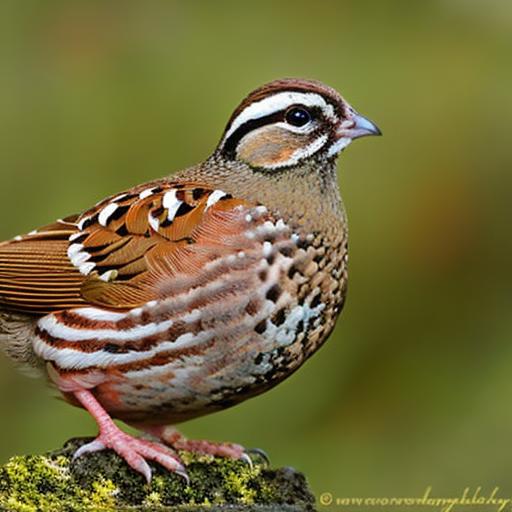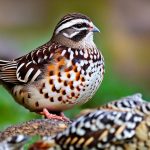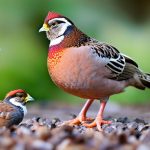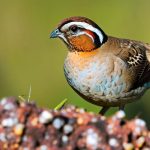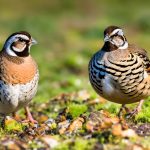Quail are small, ground-dwelling birds that have become increasingly popular as pets in recent years. They are known for their gentle nature, low maintenance, and relatively quiet demeanor, making them an ideal choice for bird enthusiasts looking for a unique and rewarding pet. Quail come in a variety of species, with the most common being the Japanese quail, also known as the Coturnix quail. These birds are native to East Asia but have been domesticated and are now found all over the world. Quail are known for their beautiful plumage, with a wide range of colors and patterns, making them a visually appealing addition to any household. They are also relatively easy to care for, requiring minimal space and maintenance compared to other types of birds. In addition to their aesthetic appeal, quail are also known for their entertaining behavior, making them a delightful and engaging pet to observe and interact with.
Quail are also known for their egg-laying capabilities, with hens capable of laying up to 300 eggs per year. This makes them not only a charming pet but also a practical one for those interested in sustainable living or small-scale farming. Quail eggs are considered a delicacy in many cultures and are prized for their nutritional value and rich flavor. As pets, quail are relatively low-cost to maintain, making them an accessible option for individuals or families looking to add a feathered friend to their home. With the right care and attention, quail can live up to 5 years, providing years of companionship and enjoyment for their owners.
Key Takeaways
- Quail make unique and low-maintenance pets, suitable for both indoor and outdoor living spaces.
- Quail require a secure enclosure with proper ventilation, bedding, and protection from predators.
- A balanced diet for quail includes commercial feed, fresh water, and occasional treats like fruits and vegetables.
- Regular health check-ups and access to a qualified avian veterinarian are essential for maintaining quail’s well-being.
- Quail are social birds that thrive in small flocks, and they exhibit natural behaviors like dust bathing and foraging.
Housing and Enclosure Requirements for Quail
When it comes to housing and enclosure requirements for quail, there are several key factors to consider to ensure the health and well-being of these birds. Quail are ground-dwelling birds and require ample space to move around and exhibit natural behaviors such as dust bathing and foraging. A suitable enclosure for quail should provide at least 1 square foot of space per bird, with additional space recommended for larger breeds or if breeding is planned. The enclosure should be secure and predator-proof, with a solid bottom to prevent digging and escape. It is also important to provide adequate ventilation to prevent the buildup of ammonia from droppings and ensure good air quality within the enclosure.
In addition to space considerations, quail enclosures should also include appropriate bedding material such as straw or wood shavings to provide a comfortable and clean living environment for the birds. Access to fresh water is essential, as quail can quickly become dehydrated, especially in warmer weather. A shallow dish or waterer should be provided, with care taken to prevent spills and contamination. Quail also benefit from access to a dust bath, which helps them maintain healthy plumage and skin condition. This can be provided in the form of a shallow tray filled with sand or fine dusting material. Overall, providing a spacious, secure, and enriching environment is essential for the health and happiness of pet quail.
Feeding and Nutrition for Quail
Proper feeding and nutrition are essential for the health and well-being of pet quail. These birds are omnivorous and have specific dietary requirements that must be met to ensure optimal health. A balanced diet for quail should consist of a high-quality commercial game bird feed that is specifically formulated for their nutritional needs. This feed should contain a mix of grains, seeds, and protein sources such as soybean meal to provide essential nutrients and energy for the birds. It is important to choose a feed that is appropriate for the age and life stage of the quail, whether they are chicks, adults, or laying hens.
In addition to commercial feed, quail can also benefit from supplemental treats such as fresh fruits and vegetables, mealworms, and greens. These treats can provide enrichment and variety in their diet but should be offered in moderation to prevent nutritional imbalances. Access to grit or small stones is also important for quail, as it aids in digestion by helping them grind up their food in the gizzard. Fresh, clean water should be available at all times, as quail have high water requirements, especially during hot weather or when laying eggs. It is important to regularly monitor the condition and behavior of quail to ensure they are eating well and maintaining a healthy body condition. By providing a balanced diet and meeting their nutritional needs, pet owners can help ensure that their quail live long and healthy lives.
Health and Veterinary Care for Quail
Maintaining the health of pet quail is essential for their overall well-being and longevity. While these birds are generally hardy and resilient, they can still be susceptible to certain health issues that require attention and care. Regular observation of quail is important to monitor their behavior, appetite, and droppings for any signs of illness or distress. It is also important to provide a clean living environment with good ventilation and proper sanitation to prevent the spread of disease.
In the event that a quail does become ill or injured, it is important to seek veterinary care from a professional with experience in avian medicine. Finding a veterinarian who is knowledgeable about quail care may require some research and networking within the avian community. Common health issues in quail can include respiratory infections, parasites, egg binding in hens, and injuries from predators or accidents. Prompt veterinary care is essential in addressing these issues and preventing further complications.
Preventative health measures such as vaccination, parasite control, and regular health checks can also help maintain the well-being of pet quail. Additionally, providing a balanced diet, clean water, and appropriate living conditions can help support their immune system and overall health. By being proactive in monitoring their health and seeking professional care when needed, pet owners can help ensure that their quail live long and healthy lives.
Quail Behavior and Social Needs
Quail are social birds that thrive in the company of their own kind. In the wild, they form flocks and engage in social behaviors such as grooming, dust bathing, and foraging together. As pets, it is important to consider the social needs of quail when keeping them in captivity. Quail should ideally be kept in groups of at least 3-4 birds to prevent loneliness and provide social interaction. Keeping them in pairs or small groups can help reduce stress and promote natural behaviors such as preening and vocalization.
Quail are also known for their gentle nature and can be easily stressed by loud noises, sudden movements, or handling. It is important to provide a calm and quiet environment for pet quail to help them feel secure and comfortable. Providing enriching activities such as dust baths, perches, and hiding spots can also help reduce stress and boredom in captive quail. Observing their natural behaviors and interactions within the group can be fascinating for pet owners and provide insight into their social dynamics.
In addition to social interaction with their own kind, quail can also form bonds with their human caregivers through positive reinforcement training and gentle handling. Building trust with quail can take time and patience but can result in a rewarding relationship between pet and owner. By understanding their social needs and providing a suitable environment for interaction, pet owners can help ensure that their quail lead fulfilling lives.
Breeding and Reproduction of Quail
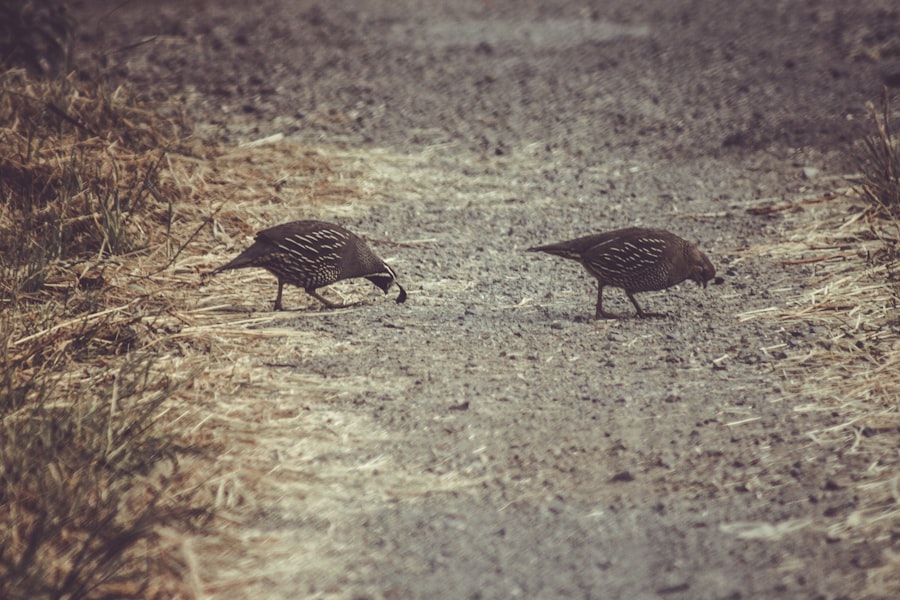
Quail are prolific breeders and can reproduce at a young age, making them an ideal species for those interested in breeding or expanding their flock. Breeding quail requires careful consideration of housing, nutrition, and genetics to ensure successful reproduction and healthy offspring. When breeding quail, it is important to provide a suitable nesting area with soft bedding material such as straw or hay for the hens to lay their eggs. The nesting area should be secluded and secure to provide privacy for the hens.
Quail eggs typically hatch within 17-18 days of incubation, with chicks being independent and able to feed themselves shortly after hatching. It is important to provide a warm brooding area for the chicks with access to food and water to support their growth and development. Care should be taken to prevent overcrowding in the brooding area to reduce stress and competition among the chicks.
Genetic diversity should also be considered when breeding quail to prevent inbreeding and maintain healthy offspring. Selecting breeding stock from unrelated lines can help promote genetic diversity and reduce the risk of genetic abnormalities. Additionally, providing a balanced diet with adequate nutrition for breeding pairs can help support successful reproduction and healthy offspring.
Legal Considerations for Keeping Quail as Pets in the UK
In the United Kingdom, there are legal considerations that pet owners must be aware of when keeping quail as pets. Under the Animal Welfare Act 2006, pet owners have a legal responsibility to ensure the welfare needs of their animals are met. This includes providing a suitable environment, diet, behavior management, housing, protection from pain, injury, disease, appropriate company (if applicable), among other considerations.
Additionally, there may be specific regulations regarding the keeping of quail in certain areas or local councils within the UK. It is important for pet owners to research any local bylaws or regulations that may apply to keeping quail as pets in their area. This may include restrictions on the number of birds allowed, noise considerations, or zoning regulations.
Furthermore, if pet owners intend to breed or sell quail or their eggs for commercial purposes, they may need to comply with additional regulations related to animal welfare standards, food safety regulations, or business licensing requirements.
By being aware of these legal considerations and ensuring compliance with relevant regulations, pet owners can enjoy keeping quail as pets while also meeting their legal responsibilities as animal caregivers in the UK.
In conclusion, keeping quail as pets can be a rewarding experience for bird enthusiasts looking for a unique and low-maintenance companion. By providing suitable housing, nutrition, veterinary care, social interaction, breeding considerations, and being aware of legal responsibilities in the UK, pet owners can ensure the health and well-being of their quail while enjoying the delightful company of these charming birds. With proper care and attention, pet quail can thrive in captivity and bring joy to their owners for years to come.
If you’re considering keeping quail as pets in the UK, you might also be interested in learning about the importance of providing a suitable coop and run for your birds. Poultry Wizard offers a helpful article on chicken coop and run plans that can be adapted for quail housing. Proper housing is essential for the well-being of your quail, so it’s worth exploring different coop options to ensure they have a safe and comfortable environment.
FAQs
What are the benefits of keeping quail as pets in the UK?
Quail are relatively low maintenance pets and can be kept in small spaces. They are also known for their gentle nature and can be a great addition to a family or individual looking for a unique pet.
What do quail eat and how do you care for them?
Quail eat a diet of seeds, grains, and insects. They also require access to grit for digestion. They should be provided with a clean and spacious living environment with access to fresh water at all times.
Are there any legal restrictions on keeping quail as pets in the UK?
In the UK, there are no specific laws prohibiting the keeping of quail as pets. However, it is important to check with local authorities and ensure that any housing or enclosures meet legal requirements.
What are the different breeds of quail that can be kept as pets in the UK?
Some popular breeds of quail that can be kept as pets in the UK include the Japanese quail, Coturnix quail, and Bobwhite quail. Each breed has its own unique characteristics and care requirements.
Can quail be kept indoors or outdoors in the UK?
Quail can be kept both indoors and outdoors in the UK, depending on the available space and the owner’s preferences. Indoor quail will require a suitable enclosure with proper ventilation and lighting, while outdoor quail will need protection from predators and the elements.
What are some common health issues to look out for when keeping quail as pets in the UK?
Common health issues in quail include respiratory infections, parasites, and egg binding in females. It is important to monitor the health of quail regularly and seek veterinary care if any issues arise.
Meet Walter, the feathered-friend fanatic of Florida! Nestled in the sunshine state, Walter struts through life with his feathered companions, clucking his way to happiness. With a coop that’s fancier than a five-star hotel, he’s the Don Juan of the chicken world. When he’s not teaching his hens to do the cha-cha, you’ll find him in a heated debate with his prized rooster, Sir Clucks-a-Lot. Walter’s poultry passion is no yolk; he’s the sunny-side-up guy you never knew you needed in your flock of friends!

